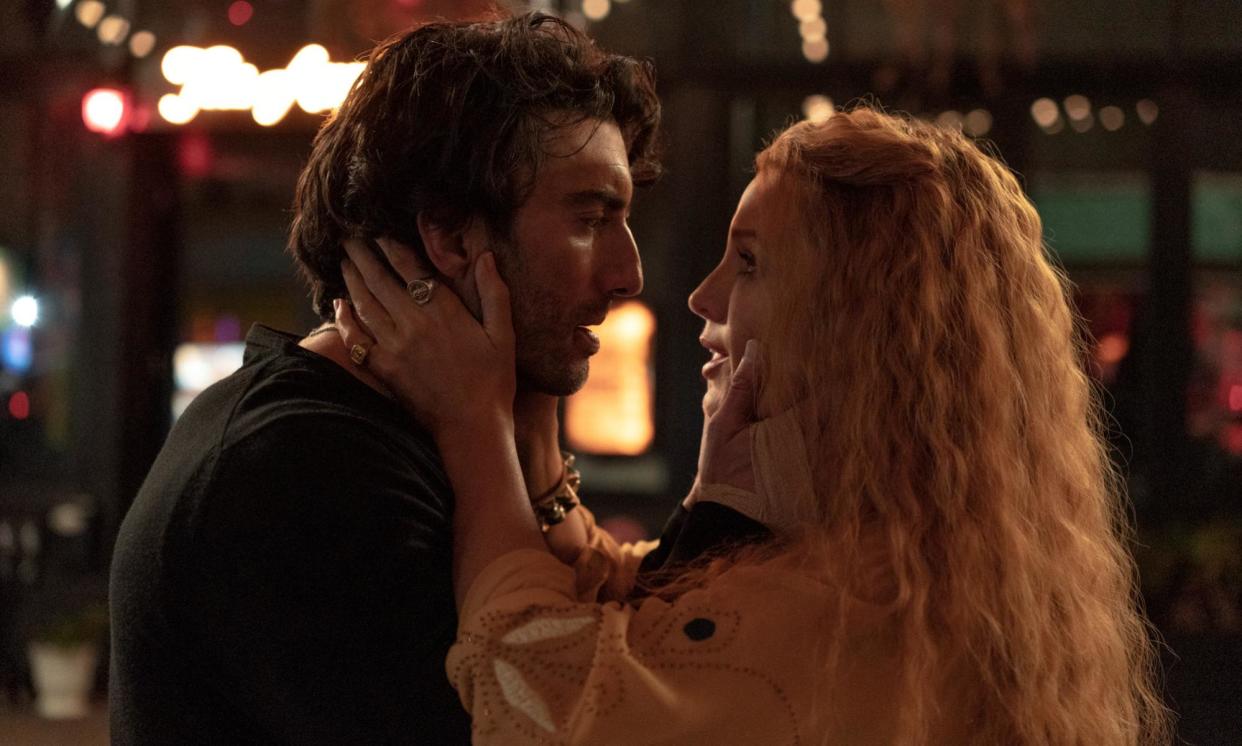It Ends with Us review – Blake Lively anchors glossy romance adaptation

Arriving as counter-programming to her husband’s No 1 Marvel skit Deadpool & Wolverine, Blake Lively’s glossy, and often rather graceful, romantic drama It Ends with Us is also trying to appeal to a powerful and vocal fanbase. Two of them, in fact, just one more obviously than the other.
Related: Cuckoo review – stylish horror offers atmosphere with incoherence
It’s based on the bestseller by Colleen Hoover, a self-published phenom who rose to ubiquity thanks in part to the rabidity of BookTok and also a Covid-inspired rise in escapist forms of reading at home. Her novels have sold over more than 20m copies worldwide, with It Ends with Us being the most popular. Her female fans are so intense that Hoover, known as CoHo, sells branded press-on nails, quote-covered sweatshirts and character-inspired earrings (her followers are known as the CoHort of course). Hoping for a Fifty Shades-adjacent hit, rights were smartly snapped up for an inevitable adaptation, and it’s one that’s also been cleverly marketed to another, even more intense and financially powerful group of fans: Swifties.
It’s led by Lively – one of the singer’s best and most photographed-alongside friends – announced by a trailer soundtracked by one of her songs and filled with enough nods to make it feel like it’s some sort of officially licensed fanfic (long hair, lumberjack shirts, fall colours, that aforementioned song playing almost in full near the end). It’s a neat act of synergy (another endorsement post is surely on the way) and is one of many reasons why It Ends with Us is likely to be a major late summer smash. The cold calculations being described here betray what’s a surprisingly compassionate and moving throwback, both to so called women’s movies of the 1940s and 50s and slick female-led studio fare of the 90s.
It’s initially hard to know how one should take a film focused on a florist named Lily Blossom Bloom but Daddio writer Christy Hall’s script boasts a sharp and much-needed self-awareness, taking a similar, and superior, tack to Kelly Marcel and Patrick Marber’s loose take on Fifty Shades of Grey. It’s a difficult balance, taking source material seriously while also understanding that a new, less attached and far broader audience will encounter it with understandable questions, and cynicism, but Hall does such a good job that one can see Hoover avoiding an EL James-style split for the inevitable sequel. It won’t be ending here …
Lively’s Bloom is a woman grappling with the recent death of an abusive father she can’t quite muster up any real grief for, diverting her attention to opening a flower shop, a long-time dream that’s finally becoming a reality. When she meets commitment-phobic neurosurgeon Ryle Kincaid (Jane the Virgin’s Justin Baldoni, also directing), she thankfully takes a minute to ridicule his name and then finds herself falling for him, both of their carefully built up walls breaking down. But a random reunion with her childhood sweetheart, Atlas (Brandon Sklenar), reminds her of a past she left behind and serves as a wake-up call to a present that’s far darker than she realises.
It’s a plot of hackneyed soap tropes but there’s a real maturity to how it unfolds, a story of abuse that’s far less obvious than we’ve grown accustomed to, the details far knottier than some might be comfortable with. There are expected cliches but there are also many that are mercifully avoided too, the story not always conforming to type. Baldoni’s direction is big and shiny (he makes the film’s $25m look like double that), filled with perfectly lit restaurants and perfectly styled outfits, a cast of handsome people living handsome lives. Yet Hall’s dialogue, while often a little too simplistic, is rooted and believable and so the heightened world isn’t difficult for us to buy into and the emotional impact isn’t difficult for us to feel affected by.
Taken with 2015’s Age of Adaline, an underrated high-concept sleeper of equally grand sentiment, Lively seems determined to reintroduce the kind of melodrama that we haven’t seen an awful lot of in recent years – or at least we haven’t seen it done as well as it is here. She’s a warm and instinctive performer and has distinct, effective chemistry with her two male leads (a younger version of her character, played by Isabela Ferrer, is an eerily perfect physical choice) as well as with her best friend, played by a winning Jenny Slate.
The life lessons being taught here about self-acceptance, self-love and self-worth might be a little pat and some of the darker elements could have afforded a tad more darkness, but It Ends with Us leads with heart first, everything else later. It’s a film of huge, sometimes hugely unsubtle, emotion but it has an effectively forceful sweep to it.
It Ends with Us is out in US, UK and Australian cinemas on 9 August

 Yahoo Movies
Yahoo Movies 
